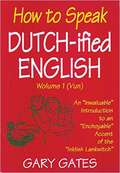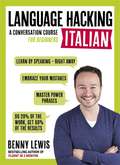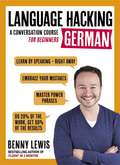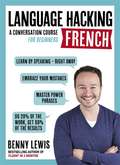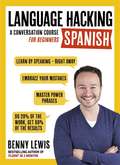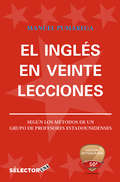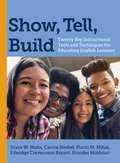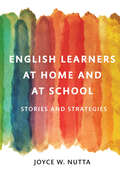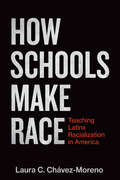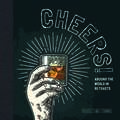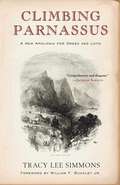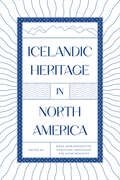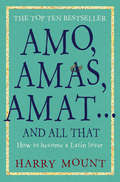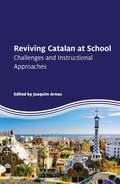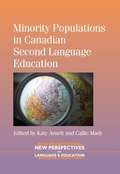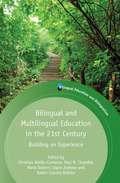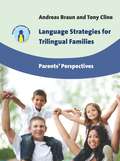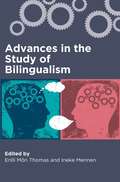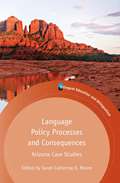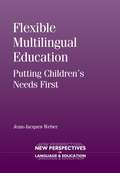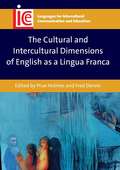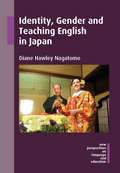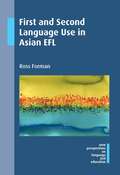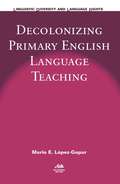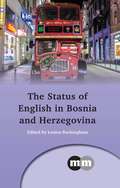- Table View
- List View
How to Speak Dutch-ified English: An "Inwaluable" Introduction To An "Enchoyable" Accent Of The "Inklish Lankwitch (Vol #1)
by Gary GatesHere is a book for anyone tired of speaking flat, colorless, homogenized English. Pennsylvania Dutchman Gary Gates provides a glossary, read-aloud section, songs, recipes, and more in this delightful, inwaluble introduction to Dutch-ified English. Learn the meaning of "rutch" and "spritz," what a "clod" and a "crotch" are, how to pronounce and make "Cussin Rachel's Snitz und Knepp," and what has happened to food when it's all. As you read this book you will not only learn how to speak better, but when an American Dutchman becomes president you will understand him when he addresses the nation in Dutch-ified English.
Language Hacking Italian (Languag Hacking with Benny Lewis)
by Benny LewisIt's true that some people spend years studying Italian before they finally get around to speaking the language. But here's a better idea. Skip the years of study and jump right to the speaking part. Sound crazy? No, it's language hacking. Unlike most traditional language courses that try to teach you the rules of Italian, #LanguageHacking shows you how to learn and speak Italian through proven memory techniques, unconventional shortcuts and conversation strategies perfected by one of the world's greatest language learners, Benny Lewis, aka the Irish Polyglot. Using the language hacks -shortcuts that make learning simple - that Benny mastered while learning his 11 languages and his 'speak from the start' method, you will crack the language code and exponentially increase your language abilities so that you can get fluent faster. It's not magic. It's not a language gene. It's not something only "other people" can do. It's about being smart with how you learn, learning what's indispensable, skipping what's not, and using what you've learned to have real conversations in Italian from day one. The Method #LanguageHacking takes a modern approach to language learning, blending the power of online social collaboration with traditional methods. It focuses on the conversations that learners need to master right away, rather than presenting language in order of difficulty like most courses. This means that you can have conversations immediately, not after years of study. Each of the 10 units culminates with a speaking 'mission' that prepares you to use the language you've learned to talk about yourself. Through the language hacker online learner community, you can share your personalized speaking 'missions' with other learners - getting and giving feedback and extending your learning beyond the pages of the book . You don't need to go abroad to learn a language any more.
Language Hacking German (Languag Hacking with Benny Lewis)
by Benny LewisIt's true that some people spend years studying German before they finally get around to speaking the language. But here's a better idea. Skip the years of study and jump right to the speaking part. Sound crazy? No, it's language hacking. Unlike most traditional language courses that try to teach you the rules of German, #LanguageHacking shows you how to learn and speak German through proven memory techniques, unconventional shortcuts and conversation strategies perfected by one of the world's greatest language learners, Benny Lewis, aka the Irish Polyglot. Using the language hacks -shortcuts that make learning simple - that Benny mastered while learning his 11 languages and his 'speak from the start' method, you will crack the language code and exponentially increase your language abilities so that you can get fluent faster. It's not magic. It's not a language gene. It's not something only "other people" can do. It's about being smart with how you learn, learning what's indispensable, skipping what's not, and using what you've learned to have real conversations in German from day one.The Method #LanguageHacking takes a modern approach to language learning, blending the power of online social collaboration with traditional methods. It focuses on the conversations that learners need to master right away, rather than presenting language in order of difficulty like most courses. This means that you can have conversations immediately, not after years of study. Each of the 10 units culminates with a speaking 'mission' that prepares you to use the language you've learned to talk about yourself. Through the language hacker online learner community, you can share your personalized speaking 'missions' with other learners - getting and giving feedback and extending your learning beyond the pages of the book . You don't need to go abroad to learn a language any more.
Language Hacking French (Languag Hacking with Benny Lewis)
by Benny LewisIt's true that some people spend years studying French before they finally get around to speaking the language. But here's a better idea. Skip the years of study and jump right to the speaking part. Sound crazy? No, it's language hacking. Unlike most traditional language courses that try to teach you the rules of French, #LanguageHacking shows you how to learn and speak French through proven memory techniques, unconventional shortcuts and conversation strategies perfected by one of the world's greatest language learners, Benny Lewis, aka the Irish Polyglot. Using the language hacks -shortcuts that make learning simple - that Benny mastered while learning his 11 languages and his 'speak from the start' method, you will crack the language code and exponentially increase your language abilities so that you can get fluent faster. It's not magic. It's not a language gene. It's not something only "other people" can do. It's about being smart with how you learn, learning what's indispensable, skipping what's not, and using what you've learned to have real conversations in French from day one.The Method #LanguageHacking takes a modern approach to language learning, blending the power of online social collaboration with traditional methods. It focuses on the conversations that learners need to master right away, rather than presenting language in order of difficulty like most courses. This means that you can have conversations immediately, not after years of study. Each of the 10 units culminates with a speaking 'mission' that prepares you to use the language you've learned to talk about yourself. Through the language hacker online learner community, you can share your personalized speaking 'missions' with other learners - getting and giving feedback and extending your learning beyond the pages of the book . You don't need to go abroad to learn a language any more.
Language Hacking Spanish (Languag Hacking with Benny Lewis)
by Benny LewisIt's true that some people spend years studying Spanish before they finally get around to speaking the language. But here's a better idea. Skip the years of study and jump right to the speaking part. Sound crazy? No, it's language hacking. Unlike most traditional language courses that try to teach you the rules of Spanish, #LanguageHacking shows you how to learn and speak Italian through proven memory techniques, unconventional shortcuts and conversation strategies perfected by one of the world's greatest language learners, Benny Lewis, aka the Irish Polyglot. Using the language hacks -shortcuts that make learning simple - that Benny mastered while learning his 11 languages and his 'speak from the start' method, you will crack the language code and exponentially increase your language abilities so that you can get fluent faster. It's not magic. It's not a language gene. It's not something only "other people" can do. It's about being smart with how you learn, learning what's indispensable, skipping what's not, and using what you've learned to have real conversations in Spanish from day one.The Method #LanguageHacking takes a modern approach to language learning, blending the power of online social collaboration with traditional methods. It focuses on the conversations that learners need to master right away, rather than presenting language in order of difficulty like most courses. This means that you can have conversations immediately, not after years of study. Each of the 10 units culminates with a speaking 'mission' that prepares you to use the language you've learned to talk about yourself. Through the language hacker online learner community, you can share your personalized speaking 'missions' with other learners - getting and giving feedback and extending your learning beyond the pages of the book . You don't need to go abroad to learn a language any more.
El Inglés en veinte lecciones
by Manuel PumaregaEl inglés en veinte lecciones es el método que ha permitido a miles y miles de personas dominar el idioma inglés sin necesidad de un maestro. A diferencia de otras obras del género, El inglés en veinte lecciones le proporciona una enseñanza clara y lógica, con lecciones que profundizan en la lengua a medida que usted avanza. Además, esta obra le ofrece los elementos fundamentales de la conversación y multitud de diálogos cotidianos para que usted practique el idioma desde el principio. El inglés en veinte lecciones es un método sencillo y práctico. Compruébelo: sin necesidad de un maestro usted puede dominar el inglés en muy corto tiempo.
Show, Tell, Build: Twenty Key Instructional Tools and Techniques for Educating English Learners
by Joyce W. Nutta Kouider Mokhtari Carine Strebel Florin M. Mihai Edwidge Crevecoeur BryantBuilding upon the theoretical and practical foundation outlined in their previous book, Educating English Learners, the authors show classroom teachers how to develop a repertoire of instructional techniques that address K–12 English learners (ELs) at different English proficiency and grade levels, and across subject areas. Show, Tell, Build is organized around two decision maps for planning and implementing differentiated instruction for ELs: the Academic Subjects Protocol (for teachers of academic subjects) and the Language Arts Protocol (for teachers of language arts). The instructional tools and techniques described in each chapter help teachers provide communication support for ELs through showing and telling, and develop their language proficiency through building their skills. The book also discusses the demands that academic language poses for ELs and ways to assess students&’ proficiency in English. Show, Tell, Build provides classroom teachers, English language development specialists, literacy coaches, and school leaders with valuable knowledge and skills to support ELs&’ academic success.
English Learners at Home and at School: Stories and Strategies
by Joyce W. NuttaThe engaging profiles of English Learners at Home and at School offer access to a deeper and broader understanding of the lived experiences of English learners and their families. Such knowledge is essential for all educators in order to anticipate the needs of, and best support, English learners.In this highly readable volume, Joyce W. Nutta helps to build the bridge of knowledge and empathy between teachers and the English learners they support. In an inspired approach to the topic, she presents six compelling portraits of English learners who come from different cultural backgrounds and who are at different points in their educational journeys, from preschool to community college. Informed by real-life observations, extensive interviews, and academic research, these lively portrayals highlight issues and concerns that commonly arise in multicultural and multilingual learning and teaching.Nutta accompanies each profile with details on the specific cultural, linguistic, and educational factors at play and offers sound practical guidance for supporting English learner achievement in classrooms. She suggests educational strategies, including establishing dual-language classrooms, adapting instruction, and inviting parent participation, that can scaffold English learners&’ academic success.English Learners at Home and at School will help educators develop a better awareness of all their students—even those who come from backgrounds vastly different from their own.
How Schools Make Race: Teaching Latinx Racialization in America (Race and Education)
by Laura C. Chávez-MorenoAn investigation into how schooling can enhance and hinder critical-racial consciousness through the making of the Latinx racialized group
Cheers!: Around the World in 80 Toasts
by Brandon CookSalut! Prost! Skål! Na zdrave! Tagay! No matter what country you clink glasses in, everyone has a word for cheers. In Cheers! Around the World in 80 Toasts, Brandon Cook takes readers on a whirlwind trip through languages from Estonian to Elvish and everywhere in between. Need to know how to toast in Tagalog? Say "bottoms up" in Basque? "Down the hatch" in Hungarian? Cook teaches readers how to toast in 80 languages and includes drinking traditions, historical facts, and strange linguistic phenomena for each. Sweden, for instance, has a drinking song that taunts an uppity garden gnome, while Turkey brandishes words like Avrupalılaştıramadıklarımızdanmışsınızcasına. And the most valuable liquor brand in the world isn't Johnny Walker or Hennessey, but Maotai—President Nixon's liquor of choice when he visited China. Whether you're traveling the globe or the beer aisle, Cheers! will show you there's a world of fun waiting for you. So raise a glass and begin exploring!
Climbing Parnassus: A New Apologia for Greek and Latin
by Tracy Lee SimmonsIn Climbing Parnassus, winner of the 2005 Paideia Prize, Tracy Lee Simmons presents a defense and vindication of the formative power of Greek and Latin. He also shows how these languages have played a crucial role in the development of authentic Humanism, the foundation of the West's cultural order and America's understanding of itself as a union of citizens. Simmons's persuasive witness to the unique, now all-but-forgotten advantages of study in and of the classical languages constitutes a bracing reminder of the genuine aims of a truly liberal education.
Icelandic Heritage in North America
by Birna Arnbjörnsdóttir, Höskuldur Thráinsson and Úlfar BragasonA celebration of cultural inheritance and the evolution of language. Mapping the language, literature, and history of Icelandic immigrants and their descendants, this collection, translated and expanded for English-speaking audiences, delivers a comprehensive overview of Icelandic linguistic and cultural heritage in North America. Drawn from the findings of a three-year study involving over two hundred participants from Manitoba, North Dakota, Saskatchewan, and the Pacific West Coast, Icelandic Heritage in North America reveals the durability and versatility of the Icelandic language. Editors Birna Arnbjörnsdóttir, Höskuldur Thráinsson, and Úlfar Bragason bring together a range of interdisciplinary scholarship to investigate the endurance of the “Western Icelander.” Chapters delve into the literary works of Icelandic immigrant writers and interpret archival letters, newspapers, and journal entries to provide both qualitative and quantitative linguistic analyses and to mark significant cultural shifts between early settlement and today. Icelandic Heritage in North America offers an in-depth examination of Icelandic immigrant identity, linguistic evolution, and legacy.
Amo, Amas, Amat ... and All That: How to Become a Latin Lover
by Harry Mount"If you know someone who missed out on Latin at school and wants to live a happier life, you could do no better than give them Harry Mount's entertainingly educative Latin primer." Daily Mail"Amo, Amas, Amat is a diverting meander and Mount's love of Latin shines out on every page." The Spectator"Latin without the pain." Guardian"If you studied Latin at school this will bring back fond memories, but even newcomers will be captivated by this witty and entertaining book..." Yorkshire Evening PostHave you ever found yourself irritated when a sine qua non or a mea culpa is thrown into the conversation by a particularly annoying person? Or do distant memories of afternoons spent struggling to learn obscure verbs fill you with dread? Never fear! Or, as a Latin show-off might say, Nil desperandum!Those endless afternoons where you struggled to remember the third person singular present indicative of volo (vult) may be a long time ago. But, if you have the vaguest memory of the ablative absolute, the locative and the gerund, you mastery of Latin will spring back to life with Amo, amas, amat...and all that. In his trip through the world's most influential language, Harry Mount uncorks its magic, drawing on Latin lovers from Kingsley Amis to John Cleese, from Evelyn Waugh to Donna Tart. Read this book and you will know Latin. Know Latin and - mirabile dictu - you will know Wilfred Owen's misery, Catullus's aching heart and the comedy of a thousand bachelor schoolmasters.
Reviving Catalan at School
by Joaquim ArnauThis book presents a comprehensive picture of languages and schools in Catalan-speaking countries, making much of the information available in English for the first time. The chapters examine multiple aspects of the language situation in these countries, including: the recovery of Catalan in schools; the position and status of the majority languages (English and Spanish); language-in-education policies in a multilingual, multicultural context; the possibility of multilingual competence; and the successes and failures of instructional processes.
Minority Populations in Canadian Second Language Education
by Callie Mady Katy ArnettUntil now, the picture painted of French second language learning in Canada has tended to focus on successful French immersion. This volume offers a broader representation, in response to the demographic changes that have made the French language classroom a more complex place. Focusing on inclusion and language maintenance, the chapters discuss how a multilingual population can add the two official languages to their repertoire whilst maintaining their languages of origin/heritage; how the revitalization of Indigenous languages can best be supported in the language classroom, and how students with disabilities can be helped to successfully learn languages.
Bilingual and Multilingual Education in the 21st Century
by Christian Abello-Contesse Paul M ChandlerBilingual education is one of the fastest growing disciplines within applied linguistics. This book includes the work of 20 specialists working in various educational contexts across Europe, Latin America and North America to create a volume which is both comprehensive in scope and multidimensional in its coverage of current bilingual initiatives. The central themes of this volume, which draws on past experiences of bilingual education, include issues in language use in classrooms at elementary, secondary and tertiary levels; participant perspectives on bilingual education experiences; and the language needs of bi- and multilingual students in monolingual schools. This collection will be of interest to teachers and administrators in bi- and multilingual education programs, as well as scholars working in the field of language education.
Language Strategies for Trilingual Families
by Andreas Braun Tony ClineThis book aims to enable parents in trilingual families to consider possible language strategies on the basis of analysing their individual circumstances. It includes a tool for diagnostic self-analysis that will help each reader to identify their situation and learn how parents in similar situations have approached the task of supporting their children's use of languages. Based on a unique survey of parents in trilingual families in two European countries, the book highlights the challenges that trilingual families face when living in mainly monolingual societies. It takes into account the recent emergence of a 'New Trilingualism' among educated parents who find themselves in trilingual families because of global trends in migration and the recent expansion of the EU.
Advances in the Study of Bilingualism
by Ineke Mennen Enlli Môn ThomasThis book provides a contemporary approach to the study of bilingualism. Drawing on contributions from leading experts in the field, this book brings together - in a single volume - a selection of the exciting work conducted as part of the programme of the ESRC Centre for Research on Bilingualism in Theory and Practice at Bangor University, Wales. Each chapter has as its main focus an exploration of the relationship between the two languages of a bilingual. Section by section, the authors draw on current findings and methodologies to explore the ways in which their research can address this question from a number of different perspectives.
Language Policy Processes and Consequences
by Sarah Catherine K. MooreThis book accessibly and comprehensively outlines the highly complex case of the English-only movement and educational language policy in Arizona. It ranges from early Proposition 203 implementation to an investigation of what Structured English Immersion (SEI) policy looks like in today's classrooms, and concludes with a discussion on what the various cases mean for the education of English learners in the state.
Flexible Multilingual Education
by Jean-Jacques WeberThis book examines the benefits of multilingual education that puts children's needs and interests above the individual languages involved. It advocates flexible multilingual education, which builds upon children's actual home resources and provides access to both the local and global languages that students need for their educational and professional success. It argues that, as more and more children grow up multilingually in our globalised world, there is a need for more nuanced multilingual solutions in language-in-education policies. The case studies reveal that flexible multilingual education - rather than mother tongue education - is the most promising way of moving towards the elusive goal of educational equity in today's world of globalisation, migration and superdiversity.
The Cultural and Intercultural Dimensions of English as a Lingua Franca
by Fred Dervin Prue HolmesThis book investigates the cultural and intercultural aspects of English as a Lingua Franca (ELF). Authors discuss how 'culture' and the 'intercultural' can be understood, theorised and operationalised in ELF, and how the concepts can be integrated into formats of ELF-oriented learning and teaching. The various cultural connotations are also discussed (ideological, political, religious and historical) and whether it is possible to use and/or teach a lingua franca as if it were culturally neutral. The chapters consider the communication and pedagogical implications of the cultural and intercultural dimensions of ELF and offer suggestions for new directions in ELF research, pedagogy and curriculum development.
Identity, Gender and Teaching English in Japan
by Diane Hawley NagatomoHow do teachers who have chosen to settle down in one country manage the difficulties of living and teaching English in that country? How do they develop and sustain their careers, and what factors shape their identity? This book answers these questions by investigating the personal and professional identity development of ten Western women who teach English in various educational contexts in Japan, all of whom have Japanese spouses. The book covers issues of interracial relationships, expatriation, equality and employment practices as well as the broader topics of gender and identity. The book also provides a useful overview of English language teaching and learning in Japan.
First and Second Language Use in Asian EFL
by Ross FormanMany Asian education systems discourage or even ban the use of L1 in L2 classrooms - although in fact L1 remains widely used by teachers. Why is L1 use still devalued in this context? By observing classes and interviewing teachers, this book explores three dimensions of L1 use in L2 teaching: pedagogy: what teachers actually do, and what they say about it; the personal: what happens to identity when we 'perform' a foreign tongue; the professional: how textbooks are used, and what is distinctive about the EFL domain.
Decolonizing Primary English Language Teaching
by Mario E. López-GoparThis book tells the story of a project in Mexico which aimed to decolonize primary English teaching by building on research that suggests Indigenous students are struggling in educational systems and are discriminated against by the mainstream. Led by their instructor, a group of student teachers aspired to challenge the apparent world phenomenon that associates English with "progress" and make English work in favor of Indigenous and othered children's ways of being. The book uses stories as well as multimodality in the form of photos and videos to demonstrate how the English language can be used to open a dialogue with children about language ideologies. The approach helps to support minoritized and Indigenous languages and the development of respect for linguistic human rights worldwide.
The Status of English in Bosnia and Herzegovina
by Louisa BuckinghamWhen Yugoslavia disintegrated in the early 1990s, competence in English was not widespread. This book explores how English came to be equated with economic survival for many during and after the ensuing war through a range of diverse social and professional contexts, from the classroom to the military to the International Criminal Court. While English provided social mobility for many, its abrupt arrival also contributed to the marginalization of those without the adequate language skills. The high level of international intervention in Bosnia and Herzegovina over the last two decades has contributed to a sense of normalization of the presence of English. Viewed as a far more complex issue than simple linguistic imposition, this book explores the widespread adoption of English and its effects on a nation recovering from war.
